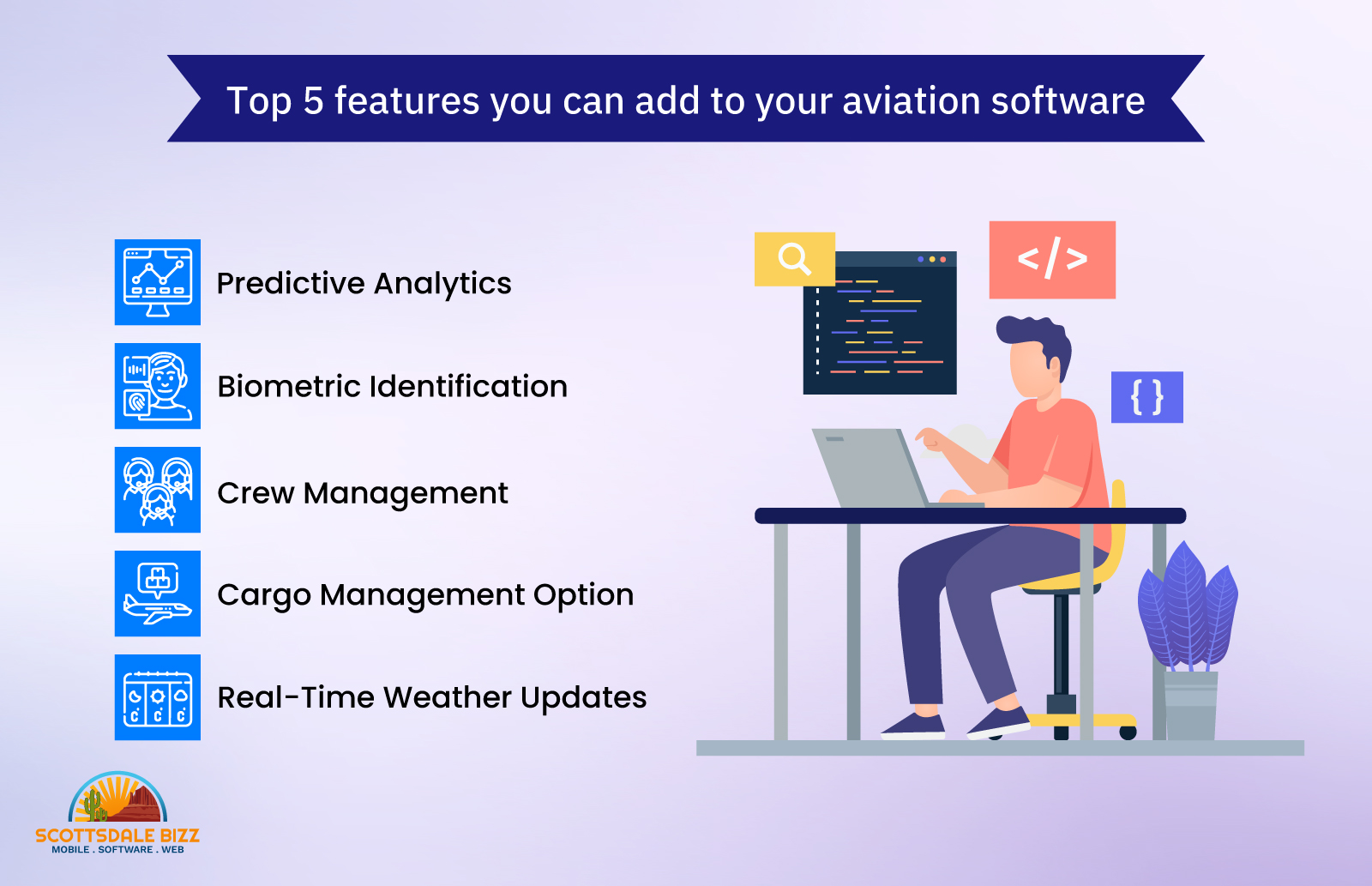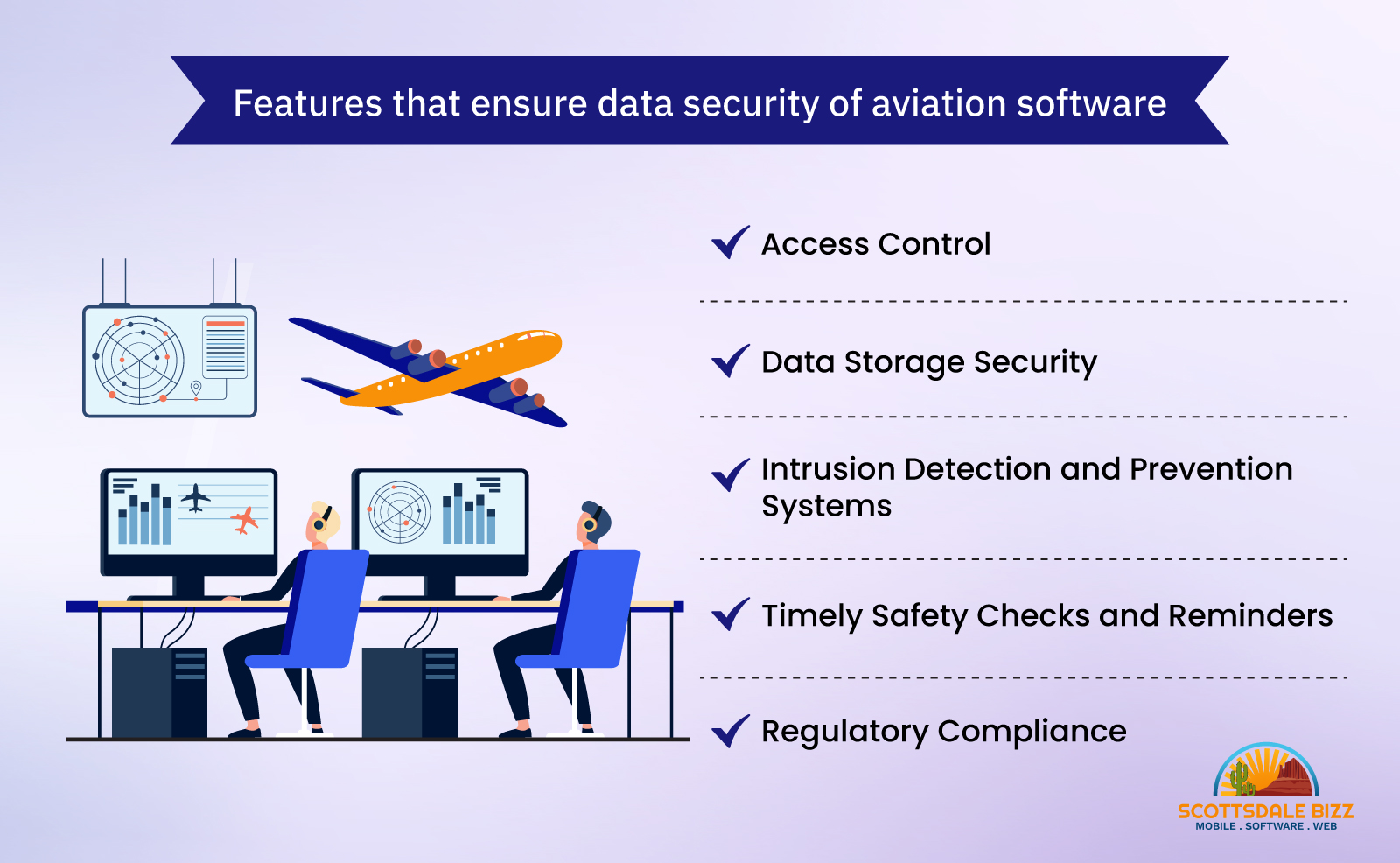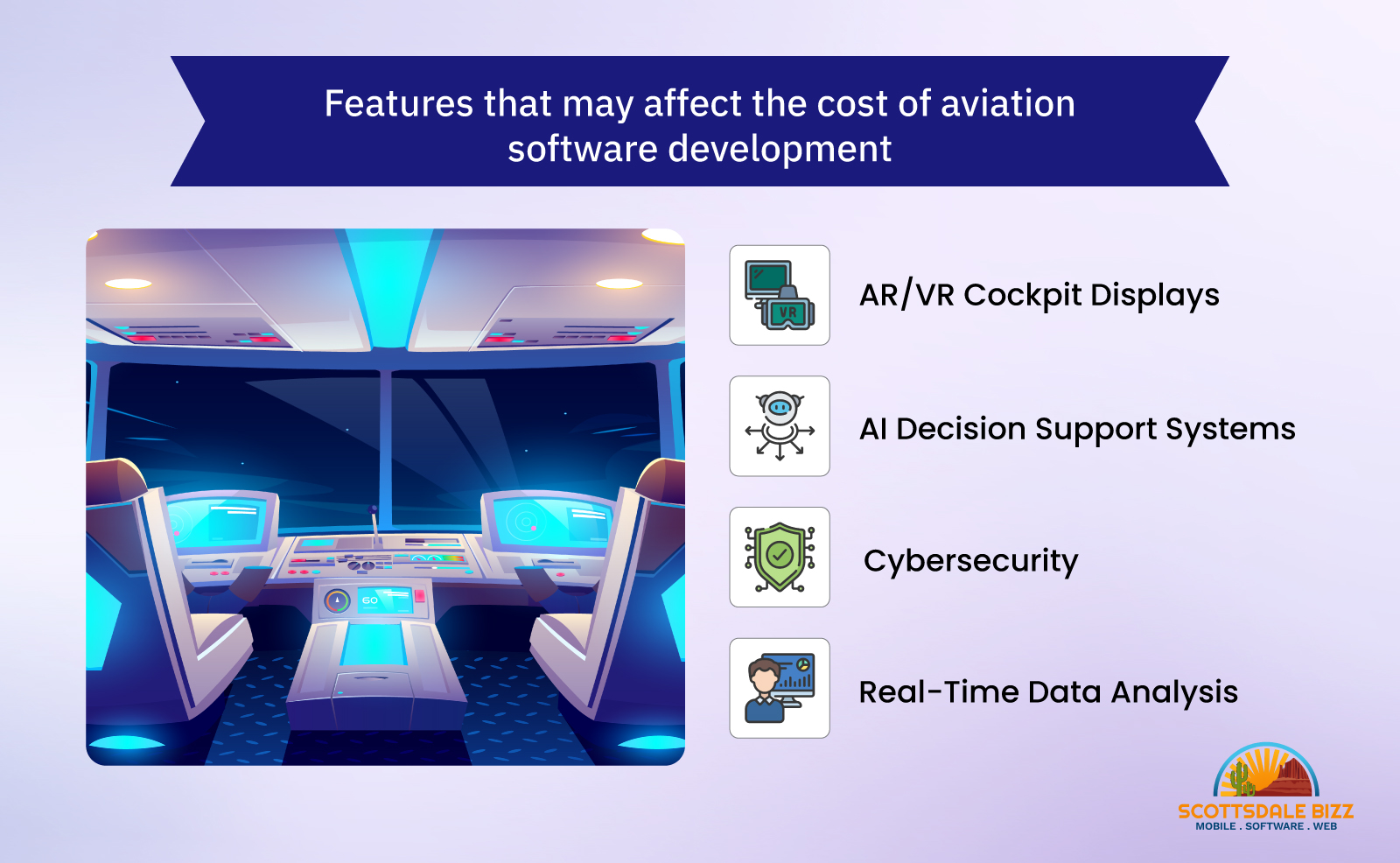September 15, 2023
By: John Tomblin, Senior Solutions Architect
ScottsdaleBizz, a division of Sofvue, LLC
Printed with permission of Data Titan, Sofvue LLC, and the author.
Small airlines have the same expectations as their larger counterparts. They must manage large data including the cargo information, passenger details, destinations, route optimization, and more. Conducting these operations simultaneously requires workforce and time, but many smaller carriers wrongly assume that development costs are too high… but that is not accurate.
Smaller airlines are often excellent candidates for custom software, mobile applications, application software systems, and even enterprise level database systems. Selection of the appropriate features is vital. That said, choosing which features provide you the best ROI is the first step of the process.
About Aviation Software
In the dynamic world of aviation, where safety and efficiency are paramount, innovative technology can optimize business flow. Aviation software is a sophisticated blend of digital tools and applications. It has emerged as a cornerstone in ensuring the seamless operation of airlines and airports, along with air-cargo and freight. At its core, aviation software combines a wide array of processes designed to streamline diverse operations.
From flight planning and navigation to aircraft maintenance and passenger management, these software systems contribute to enhanced precision, reduced operational costs, and, most importantly, elevated safety standards. For example:
✅ Flight planning software enables airlines to find optimal routes, considering factors such as weather conditions, air traffic congestion, and fuel efficiency.
✅ Cockpit avionics software is another solution that assists pilots in real-time navigation, displaying critical information on flight performance and surroundings.
✅ Maintenance management software tracks an aircraft's health, scheduling necessary repairs and inspections, preventing unplanned downtime.
✅ Passenger-focused applications have revolutionized the flying experience. Online booking platforms, self-check-in kiosks, and mobile boarding passes simplify travel procedures.
✅ You can also add entertainment systems to keep passengers engaged during the journey, transforming planes into entertainment centers while in flight.
Top features you can add to software
Suitable aviation software is integrated with world-class features for impressive user-experience and seamless operations. Here is a detailed list of optimal features that elevate the performance of your aviation software.

➤ Predictive Analytics: Predictive analytics has emerged as a game-changing feature within aviation software. By analyzing vast amounts of historical and real-time data, predictive algorithms can foresee potential issues, enabling airlines to proactively address maintenance needs, optimize flight routes, and reduce delays. This not only enhances operational efficiency but also ensures passenger safety by identifying and addressing concerns before they escalate.
➤ Biometric Identification: Bid farewell to lengthy queues and welcome the convenience of biometric identification. Aviation software integrated with biometrics, such as fingerprint and facial recognition, streamlines passenger processing at various touchpoints. From check-in to security checks and boarding gates, travelers experience a seamless journey while authorities benefit from heightened security and accurate identification.
➤ Crew Management: Crew management is vital for orchestrating a smooth flight operation. Advanced aviation software offers comprehensive crew scheduling, communication, and task assignment capabilities. Pilots, flight attendants, and ground staff can collaborate effectively, ensuring that flights are impeccably managed from departure to landing. This results in enhanced coordination, reduced errors, and improved passenger experiences.
➤ Cargo Management Option: The efficient movement of cargo is integral to aviation, and dedicated cargo management features within aviation software are streamlining this process. From tracking cargo in real-time to optimizing loading and unloading procedures, this feature ensures that airlines and freight operators can effectively manage shipments, minimize delays, and enhance overall operational efficiency.
➤ Real-Time Weather Updates: Weather conditions can significantly impact flight operations. Aviation software equipped with real-time weather updates empowers pilots and operators with accurate and up-to-the-minute information. This enables them to make informed decisions, adjust flight routes to avoid turbulence or adverse weather, and ensure the safety and comfort of passengers and crew.
Check out our portfolio: Airwest Design
Features that ensure data security of aviation software
Technology has its pros and cons, and one of the downsides of the digital world is data sensitivity. Airlines possess huge data and confidential information of its passengers that needs to be protected at all costs. But hackers possess the technical knowledge that enables them to breach data security. For your software application to be deemed safe and secure, it must incorporate the right mix of security features. Here’s a few to consider.

◾Access Control: There should be strict guidelines on who can view the available data. For example, all the passenger-related information should be available only to the teams concerned or staff. Multi-factor authentication, biometric recognition, and role-based access control are effective measures to prevent unauthorized entry and data breaches.
◾Data Storage Security: If aviation software stores data locally, it should be stored in secure environments with access restricted to authorized personnel. You can enable Cloud storage with data security precautionary measures. Regular backups and disaster recovery plans should also be in place to prevent data loss.
◾Intrusion Detection and Prevention Systems: Abbreviated as IDPS, these systems are highly popular when it comes to data and online security. They constantly monitor and filter your online traffic and system behavior. All the issues are flagged on time so proper measures can be taken. If you are planning to get aviation software developed for your airline, then iterating an IDPS should be included in your priority list.
◾Timely Safety Checks and Reminders: Conducting routine security audits and penetration testing is vital to identifying vulnerabilities in the software. This proactive approach helps in discovering and addressing potential weak points before malicious actors can exploit them. You can integrate the software with risk detection systems that also send reminders when any security software needs to be updated.
◾Regulatory Compliance: Your software must comply with all federal and state regulatory laws. Ensuring that the aviation software aligns with industry-specific regulations, such as GDPR for handling passenger data, is essential. Compliance with such regulations not only avoids legal issues and charges but also enhances the overall security posture.
Features that may affect the cost of aviation software development
Advanced features can add next-level performance to your aviation software solutions. Integrating these features may provide ease to your staff and users, but these high-end features certainly elevate the development costs. Here is a compiled list of some advanced and expensive features that might find a place in your aviation software project.

● AR/VR Cockpit Displays: One of the most innovative and expensive features, AR/VR cockpit displays can enhance pilots' situational awareness and training experiences. Developing such displays requires advanced graphics programming, hardware compatibility, and ensuring that the technology meets strict safety and certification standards.
● AI Decision Support Systems: Developing artificial intelligence systems that provide advanced decision support to pilots and operators requires substantial resources, which can add to development costs. These systems use machine learning algorithms to process vast amounts of data and provide insights that aid in making critical decisions.
● Cybersecurity: Cyber threats can come in many forms and your software should be readily equipped with features that can prevent security breaches. Implementing advanced cybersecurity measures, including intrusion detection systems, firewalls, regular security audits, and compliance with aviation industry standards, can be a significant investment.
● Real-Time Data Analysis: Data analysis itself is a remarkable approach towards improving the efficiency of any business by carefully studying data. Tracking and analyzing real-time data require time, effort, and computational resources. This adds to the development cost, which includes not only the development of the analytics algorithms but also the hardware and software needed to handle the data flows.
Factors to consider when selecting an aviation software development company
Developing aviation software, application, or custom software can be expensive as it requires advanced tools and resources. Hiring a reliable and professional software development company is extremely important. Your software should be well-integrated with optimized technologies, which can only be done by a trained software developer. You should keep the following factors in mind when searching for an aviation software development company.
1. Experience: A start-up development firm or individual coder may certainly possess the technical know-how, but it's advisable to opt for a development firm with a long, proven track record and a large number of reviews and letters to back it up. Seasoned professionals bring an in-depth understanding of both their craft and relevant technologies to the table, but for the best results, place your trust in a service provider with at least 20 years of experience.
2. Client Reviews: Find out what the customers say about the service provider. You can do this by reading letters of recommendation or calling past clients directly. You can also head over to the company’s website where you will find reviews and the company’s portfolio. This will give you an idea of their service quality.
3. Ongoing Maintenance and Support: Ongoing maintenance and support from software development companies ensure consistent functionality, timely updates, and rapid issue resolution, fostering software reliability and optimal performance over time.
4. Data Security Measures: Your software must comply with all necessary regulations that ensure data security. Ensure that the service provider chosen follows strict data security measures to avoid the chances of security breach and data theft.
Frequent questions asked about Aviation Software Development
How much do you charge for aviation software development?
The overall cost depends on factors like UI/UX design, customization, project complexity, specifications, etc. You can contact our support team for further details on our pricing structure.
Does Scottsdale Bizz provide custom software development services?
Yes. We offer custom software development services tailored to your specific needs. Our experienced team of developers creates solutions to address your unique requirements, ensuring optimal functionality and user satisfaction.
How much time do you take to develop a custom aviation management application system?
We have a dedicated team of architects, engineers, analysts, developers, designers, and programmers who seamlessly deliver custom software on time. Typical custom software takes about 3-12 months to complete but the exact time limit depends on the project scope and complexity, features, etc.
Conclusion
The aviation industry is continually evolving and improving, and technology has played a major role in avionics, flight, and passenger safety. If you find yourself in search of a reliable aviation software development company, Scottsdale Bizz can serve.
Our team of architects, engineers, analysts, developers, designers, and managers are highly skilled in delivering world-class and end-to-end aviation management software solutions. We have two decades of experience in software development for companies nationwide.
Scottsdale Bizz, a division of Data Titan and Sofvue, LLC, caters to customers and clients across the United States, and we can reshape your business using the latest and state-of-the-art technologies. To learn more about our development services, contact us at 623-845-2747.
You may also like to read: How Using Custom Software Can Be Applied to Increase the Operational Efficiency of Solar Panels
RE: 11637




